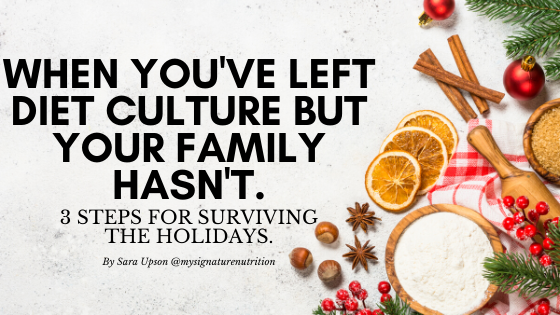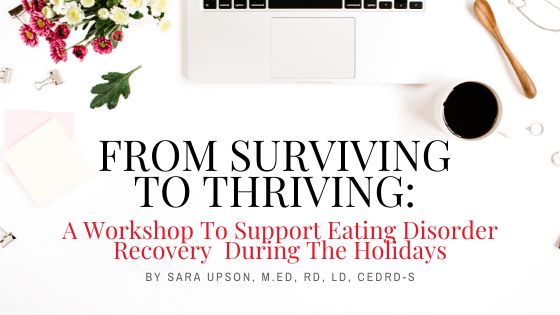When you’ve left diet culture but your family hasn’t. 3 tips for surviving the holidays.
November 17th, 2019 by Sara Upson

I once had a client who was doing everything they could to avoid diet culture and diet culture comments. It go to the point where they stopped reading magazines, stopped watching TV, and even stopped listening to the radio. (This was a while back- I’m not sure anymore listens to the radio anymore…)
They felt so much better with the decrease in diet culture messages until one day they left work, walked out to their car and on the windshield was a flyer for a weight loss clinic.
You can take all the steps to avoid diet culture, diet talk, eliminate it from your life (as much as possible) but it still seems to find a way to creep in- especially with friends and family. Especially at the holidays.
And the truth is, family is often the worst about it. This is even backed up by research. The number one place that people experience weight stigma is with their family.

So many people struggle with negative food and body comments from their family, especially at the holidays. And you may be most sensitive to these comments since they’re the people who are supposed to love you the most.
Certainly body comments and food comments hurt no matter where they come from, but from the people closest to you, it just seems to hurt more.
Sadly, even though you’ve changed- you’ve dropped out of diet culture, are recovering from an eating disorder, or discovered intuitive eating and no longer want to participate in that way of life- it doesn’t mean that they have and they often just stay stuck. It’s so frustrating. And I’m sorry it’s like that for you.
I can validate that it’s like that for so many people, and honestly- even me too!
To help you experience a more enjoyable and supportive holiday season, here are 3 steps to prepare yourself for the onslaught of diet culture from those closest to you at the holiday:
First Set Boundaries
Boundaries are essential at all times but especially at holidays and special events. Boundaries are a way of defining what you’re okay with and what you’re not okay with.
You can set boundaries in any area of life and this blog focuses on establishing boundaries with food, body, eating, diet talk, body talk and of course add anything else that would be supportive to you.
Once you’ve established these boundaries- or if it’s easier you could think once you’ve defined what you’re okay with and what you’re not okay with- then the next step is to communicate them

Something you could try is saying something like this- “This year I really want to focus on the intention of the holiday and on creating a satisfying eating experience. This means no talking about food, eating or bodies in terms of good, bad, clean, healthy, unhealthy, sinful, guilty, or innocent is allowed.”
You could also be more direct- “I’ve established some ground rules for the holiday this year to make it a safe and more enjoyable experience for everyone. No body talk, no weight comments, no diet talk, no labeling foods. Let’s focus on connection and satisfaction instead.”
You can also try the vulnerable approach- “I’ve really been working on changing my relationship with food the past year(s). It’s changed how I feel so much and how I live my life. I know you care about me and want to support me. One of the best ways you can do that is by not labeling foods, making food comments, or commenting on weight, body shape or size- either my body or anyone else’s.”
Second, be prepared to change the conversation and respond to body talk.
I wish all you had to do was declare your boundaries and then your family could honor them, but sadly most can’t. Diet talk and body comments are just so common. Yes, assert your needs but then be prepared to change the conversation and to respond to negative body comments
Change the conversation:
Changing the conversation is a skill and a valuable one to build! Anytime you’re building a skill that means that you have to practice it. You can use these suggestions with any conversation and also practice with any conversation so that you’re prepared for when the diet or body talk comments come up.
One way to change the conversation is to use a transitional word. Some are abrupt and express your obvious dislike to the conversation. Words like, “so anyways, anywho” communicate this.
Another way is to literally excuse yourself from the conversation . When it comes to diet or body talk, instead of engaging or trying to deflect you just say, “excuse me” and go get a drink, take a break, go to the restroom, anything. It’s just a way to leave.
And one more way would be to bring up completely different and tell them that you’re changing the conversation. For example, if someone says “Ugh that food is so bad for you.” Then you can responds and say “Not to change the conversation, but have you seen <insert latest movie, sporting event, current event, or new trend here>.”
Responses:
Here are some ideas for responses in talking back to diet culture. With different types of responses you can try.
If you’re able, practice using these responses and changing the conversation before you get to your event- that way it feels more comfortable to you.
Another tactic you can try is to plan ahead and build in diversions. For example, plan games for the table, use conversation cards, have everyone share a memory or express gratitude.
Third, be prepared to support yourself.
Sometimes people just can’t give you what you need and it sucks. You can clarify your boundaries, you can ask for what you need, others can agree- but then not be able to follow through and this is so hurtful. And also so common.
Sometimes people just can’t be who you want or need them to be. Especially when it comes to family.

In this case it’s important to be prepared with your own support system or plan for how you’ll support yourself. For how you’ll move forward (and deal with your emotions about being let down) so that you can continue to work towards recovery.
For this part, consider if people continue with diet talk, make hurtful comments, or completely disregard your wishes, what will you do?
Example: leave, take a break, text a friend, talk to a safe person, practice grounding, deep breathing, etc.
It’s important you have a plan or idea in mind so if it gets to this, you already know what you’re going to do and not feeling so stuck.
If it’s helpful- write this out, put in notepad on your phone or text it to yourself.
The most important thing here is to care for yourself, ask for what you need, be prepared to support yourself so that you can have a more enjoyable holiday.
To support you with that, I’ve written this permission slip for you. Of course add anything else you need or want.

Permission Slip For: _____________________________
- You have permission to eat. To eat foods you enjoy. To eat as much as you want.
- You have permission to say no to conversations that are not supportive to you, to leave conversations, to not answer questions and to stand up for yourself.
- You have permission to say no to diet talk or talk rooted in diet culture.
- You have permission to define boundaries to create a safe and more comfortable experience for you. And you have permission to hold these boundaries.
- You have permission to ask for what you need and reach out for support.
That is my hope for you. If you’d like more support doing this, more ideas, more specific planning then my holiday workshop is perfect for you. Check out more information here:

A Note For Families
And on a final note for families- this is how you can support your loved one in eating disorder recovery, dropping out of diet culture, and intuitive eating.
Do Not:
- Do not comment on food, label food, or talk about food in terms of good/bad/healthy/unhealthy.
- Do not make comments about your eating patterns or anyone elses. (i.e. I’m being so bad.)
- Do not rationalize or justify your eating. ( i.e. “It’s okay, I’m going to the gym later”)
- Do not make body comments of any kind- about yourself or someone else.
- Do not talk about diets, dieting, restriction- this includes for health reasons as well.
Do:
- Ask your loved one how you can be supportive during a stressful time
- Create a plan in advance for how they can ask for support (i.e. key word, special signal, etc).
- Make sure all the foods they need are available (especially if they’re on meal plan).
- Talk to family members in advance about not engaging in diet or body talk.
- Help your loved one hold boundaries and change the conversation for topics that are unsupportive to them.
- Leave early or take a break if needed and support your loved one to do what they need to do to care for themselves.






November 25, 2019 at 4:43 am, Do this one thing to lessen the impact of diet culture comments. For The holidays & beyond. – MySignatureNutrition said:
[…] how to set boundaries, how to change the conversation, how to respond, how to reach out for support (as seen in this blog about the holidays). BUT the fear still […]